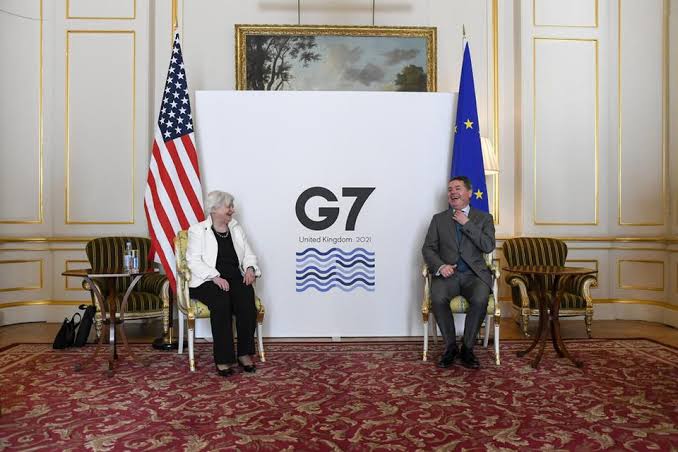Efforts to force multinational companies to pay a fairer share of tax have taken a decisive step forward after 130 countries and jurisdictions agreed to plans for a global minimum corporate tax rate.
In a landmark moment for the world economy, the Organisation for Economic Co-operation and Development (OECD) issued a statement committing each of the countries to a two-pillar plan to radically reshape the global tax system.
Building on an agreement between the G7 in London last month, the latest breakthrough brings together all of the nations in the G20 group of the world’s biggest economies, including China, India, Brazil and Russia.
However, some countries, including Ireland, Hungary, and Estonia, are yet to sign the reforms, which are being negotiated with 139 participants in talks organised by the Paris-based OECD.
The others not to have signed at this stage are Barbados, Kenya, Nigeria, Sri Lanka and St Vincent & the Grenadines. Peru abstained because it currently does not have a government.
Several jurisdictions with low or zero corporation tax rates commonly regarded as tax havens – including the Cayman Islands and Gibraltar – were among signatories to the deal. Sources close to the process said it was clear to these places that the “writing was on the wall”.
The principle of the agreement is that multinationals would be forced to pay a minimum of 15% tax in each country they operate in. It also includes plans to prevent the shifting of profits into tax havens by tech giants and other multinationals by enabling signatory countries to tax the world’s largest companies based on revenues generated within their borders.
The OECD said more than $100bn (£73bn) was expected to be raised by curbing profit shifting. About $150bn is expected to be raised from the global minimum tax rate.
The announcement comes ahead of further talks on tax reforms expected to be held between finance ministers at G20 meetings in Venice next month, with ambitions for a final global deal to be agreed upon by October and implemented in 2023.
Mathias Cormann, the OECD’s secretary-general, said: “After years of intense work and negotiations, this historic package will ensure that large multinational companies pay their fair share of tax everywhere.”
Some nations and jurisdictions with low tax rates, including Cyprus, were not part of the OECD talks, while the nine countries that refused to join the agreement at this stage set low tax rates below 15%. Ireland’s headline corporate tax rate is 12.5% and Hungary’s is 9%.
Sources said Ireland had been engaged in positive and constructive talks but was holding back from an agreement given its lower tax rate and a desire to see further progress in the US, where Joe Biden must push US tax reforms through a divided Congress.
Hopes remain, however, that a global deal will be achieved. The 130 nations that have signed so far account for 90% of the world economy. Biden said the breakthrough put the world in a “striking distance of full global agreement to halt the race to the bottom for corporate taxes”.
“With a global minimum tax in place, multinational corporations will no longer be able to pit countries against one another in a bid to push tax rates down and protect their profits at the expense of public revenue,” he said.
Details contained in the OECD statement confirmed an exemption for financial services and natural resources companies as part of the “pillar one” agreement. Finance firms and mining giants will, however, be subject to the minimum tax rate. The UK chancellor, Rishi Sunak, had pushed for the City of London to be excluded from the global tax overhaul amid concerns it would undermine the UK financial services industry.
Sunak said he was pleased to see momentum had been continued after the G7 meetings in London last month. “The fact that 130 countries across the world, including all of the G20, are now on board marks a further step in our mission to reform global tax,” he said.

 Forex3 weeks ago
Forex3 weeks ago
 Naira3 weeks ago
Naira3 weeks ago
 Billionaire Watch3 weeks ago
Billionaire Watch3 weeks ago



 Naira3 weeks ago
Naira3 weeks ago






 Naira3 weeks ago
Naira3 weeks ago




 Naira2 weeks ago
Naira2 weeks ago




 Naira4 weeks ago
Naira4 weeks ago






 Naira2 weeks ago
Naira2 weeks ago












